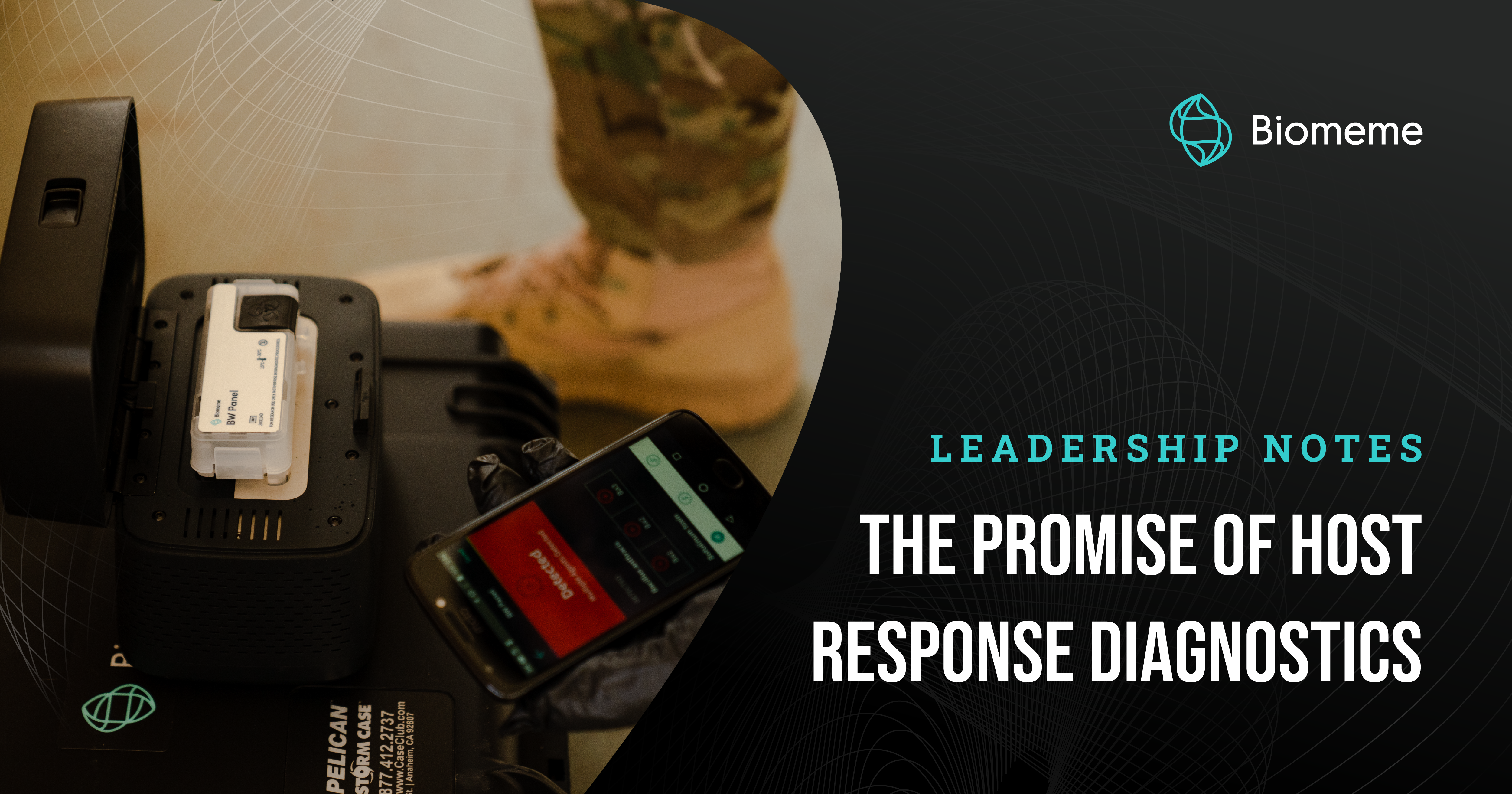
Written By: Jesse vanWestrienen
Since 2012, Biomeme has been dedicated to addressing global health challenges by developing state-of-the-art platforms and decentralized testing solutions that can detect and identify infectious disease, and more recently, rapidly analyze host immune responses.
Now imagine a future in which fast, accurate, and reliable point-of-need testing options are ubiquitous – in homes, hospitals, doctor’s offices, nursing facilities, and on the frontlines of battle and disease outbreaks. The team here at Biomeme is working tirelessly toward that goal by developing novel Isothermal amplification technology, alongside our mRNA Host Response technology and our next generation Franklin® ISP instrument. Together, these advancements can be used to improve the speed, sensitivity, and specificity in point-of-need diagnostics.
I recently attended the Association for Diagnostics and Laboratory Medicine’s annual scientific meeting and roamed the booths at its clinical lab expo. It was energizing to engage with hundreds of global companies and leaders dedicated to cutting-edge molecular diagnostic technologies that address current and future health challenges — like sexually transmitted diseases and the next pandemic.
What captured my attention most, however, was the rise of tests utilizing Isothermal amplification, most of which were LAMP based. I was excited to speak about Biomeme’s novel Isothermal amplification technology we are developing. Before delving into that, it's important to understand some of the advantages of Isothermal diagnostics and how it stacks up against the gold-standard, Real-Time Polymerase Chain Reaction (q-PCR).
There are pros and cons to any amplification method, but two distinct advantages of Isothermal diagnostics include fast results and generally, a lower-cost method for detection.
This promising combination of advantages, combined with a compact instrument like Biomeme’s Franklin® ISP, makes running syndromic pathogen panels and measuring host gene expression at the point-of-need achievable and affordable. Importantly, it enables us to develop point-of-need solutions without having to significantly modify our hardware systems to run the new chemistry. More simply, having an easy-to-use diagnostic platform that can quickly test for a range of infectious agents enables healthcare professionals to save money, time, and lives.
PCR testing uses a thermocycler to apply heat energy to separate DNA and then cool reactions to allow for amplification to occur when testing a sample. Tests using Isothermal technology operate at a constant temperature and use enzymes to unzip DNA and then amplify the target to detectable levels in the sample. The challenge with Isothermal chemistries can be ensuring the enzymes do not non-specifically amplify targets in the sample that are not intended.
Biomeme is developing a novel solution to that problem using Differential Targeted Endonuclease Cleavage Technology (DTECT™) that directs the enzyme to a specific target of interest, ensuring that the limited resources of testing a sample are not wasted. Our goal is to reduce the total time of testing, from sample collection to results, to 15 minutes or less using an automated process that a non-laboratory technician could administer using the smallest amount of sample possible. These tests could be run anywhere in the field by anyone.
As of now, the plan is to introduce our Isothermal technology in a phased approach over the coming year. Initially, we are focusing on creating an STI panel including antibiotic resistance markers as a model system to demonstrate the capabilities of the new chemistry. Using the insights gained in early development, the R&D team will incorporate our Isothermal technology into our Host Response diagnostic pipeline. We will also integrate Isothermal diagnostics into our Biowarfare Panel.
Consider the real-world impact of this technology, exemplified by the case of sexually transmitted infections (STIs). According to the World Health Organization (WHO), over one million new STI cases emerge daily worldwide, with most being asymptomatic. Annually, this totals a staggering 374 million new infections, of which 25 percent are curable. STIs can lead to infertility, cancer, complications during pregnancy, and heightened vulnerability to HIV.
In the past decade, we've witnessed remarkable strides in diagnostic instrumentation. However, the next frontier in diagnostic science revolves around point-of-need molecular testing solutions – systems that deliver swift results and timely interventions while upholding sensitivity and specificity. This is precisely where our groundbreaking Isothermal chemistry sets Biomeme apart, much like our innovative Host Response Test (HR-B/V). We're on a mission to expand our existing hardware and consumable platform to encompass tests developed using this new and improved chemistry.
By developing Host Response, STI, and Biowarfare Agent diagnostic tools, we are putting frontline diagnostic capabilities directly into the hands of individuals precisely when and where they are needed. This initiative is a pivotal step towards creating a healthier planet for all of us.
Products currently under development and not approved/cleared by the FDA.
Get the latest tips from Biomeme shipped right to your inbox

After 15 years working in molecular diagnostics, I know how far the science has come and who is doing what in this industry. And right now is an incredible time to be working in the IVD space because...

Since 2012, Biomeme has been dedicated to addressing global health challenges by developing state-of-the-art platforms and decentralized testing solutions that can detect and identify infectious...

Biomeme CEO Max Perelman explains why host response testing has the potential to transform global health – starting with military preparedness. It’s not hard to imagine how the next pandemic could...
401 North Broad St Suite 222 Philadelphia, PA 19108